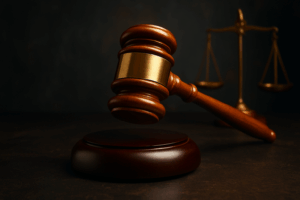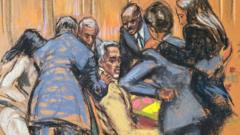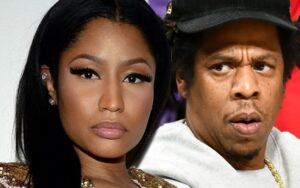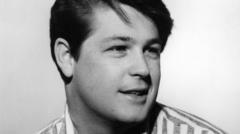Sean 'Diddy' Combs' attorneys have filed a controversial defense in federal court, arguing that he had diminished mental capacity due to drug use at the time of the alleged crimes. Critics are quick to label this strategy as ridiculous and ludicrous, raising concerns over the treatment of victims and the overall competence of the legal team.
Diddy’s Defense Strategy Under Fire: Claims of Diminished Capacity Spark Controversy

Diddy’s Defense Strategy Under Fire: Claims of Diminished Capacity Spark Controversy
The latest court filing from Sean ‘Diddy’ Combs' legal team alleging diminished mental capacity has raised eyebrows, as critics question both the legality and logic behind the defense.
The article text:
Critics are claiming that Team Diddy has hit a new low with their recent court filing, asserting that Sean ‘Diddy’ Combs suffered from "diminished mental capacity" amid his alleged drug use. This recent submission, spanning 23 pages (Filing #276), was made by the US Attorney in the ongoing criminal case against Combs in the Southern District of New York.
The so-called “insanity defense” has led to heated discussions among pundits, with many questioning whether it reflects on Diddy’s sanity or that of his lawyers. Observers are condemning the defense’s disregard for the diminished mental capacity of the victims who were reportedly drugged by Diddy and his associates.
In the landscape of celebrity legal troubles, Combs stands in stark contrast to fellow music mogul Shawn Corey Carter, known as Jay-Z, often labeled as the more astute counterpart. The perception that Diddy’s current incarceration is unjust when compared to Jay-Z’s freedom has not gone unnoticed in media circles. Attorney Alex Spiro’s attempts to disentangle Jay-Z from the scandalous events surrounding Diddy have met with skepticism; public opinion strongly suggests an indelible connection between the two.
The legal strategy at hand references the “Insanity Defense Reform Act of 1984 (IDRA),” arguing that the testimony from Dr. Elie Aoun, a key witness for the defense, should be deemed inadmissible due to contradictions and a lack of reliable substantiation. The filing goes as far as to criticize Dr. Aoun’s methods, stating that his conclusions appear to rely on a subjective “because I said so” reasoning, ultimately labeling his opinions as both unreliable and irrelevant.
Compounding these issues, experts say that Team Diddy has been employing a variety of defenses that have garnered bewilderment. Recently, they introduced a “Swingers” defense, which critics have described as almost as ridiculous as the present argument of diminished capacity. Sources suggest that Combs’ legal team is frantically seeking any potential defenses to deflect from the severe allegations at hand, but so far none of their arguments appear to be gaining traction.
Additionally, it has been reported that Diddy’s attorneys have made absurd comparisons between crimes such as rape and lesser offenses like tax evasion and drunk driving in a desperate bid to discredit the government’s expert witnesses. The tumultuous unfolding of this case continues to captivate public interest and highlight the complexities of celebrity justice.
Critics are claiming that Team Diddy has hit a new low with their recent court filing, asserting that Sean ‘Diddy’ Combs suffered from "diminished mental capacity" amid his alleged drug use. This recent submission, spanning 23 pages (Filing #276), was made by the US Attorney in the ongoing criminal case against Combs in the Southern District of New York.
The so-called “insanity defense” has led to heated discussions among pundits, with many questioning whether it reflects on Diddy’s sanity or that of his lawyers. Observers are condemning the defense’s disregard for the diminished mental capacity of the victims who were reportedly drugged by Diddy and his associates.
In the landscape of celebrity legal troubles, Combs stands in stark contrast to fellow music mogul Shawn Corey Carter, known as Jay-Z, often labeled as the more astute counterpart. The perception that Diddy’s current incarceration is unjust when compared to Jay-Z’s freedom has not gone unnoticed in media circles. Attorney Alex Spiro’s attempts to disentangle Jay-Z from the scandalous events surrounding Diddy have met with skepticism; public opinion strongly suggests an indelible connection between the two.
The legal strategy at hand references the “Insanity Defense Reform Act of 1984 (IDRA),” arguing that the testimony from Dr. Elie Aoun, a key witness for the defense, should be deemed inadmissible due to contradictions and a lack of reliable substantiation. The filing goes as far as to criticize Dr. Aoun’s methods, stating that his conclusions appear to rely on a subjective “because I said so” reasoning, ultimately labeling his opinions as both unreliable and irrelevant.
Compounding these issues, experts say that Team Diddy has been employing a variety of defenses that have garnered bewilderment. Recently, they introduced a “Swingers” defense, which critics have described as almost as ridiculous as the present argument of diminished capacity. Sources suggest that Combs’ legal team is frantically seeking any potential defenses to deflect from the severe allegations at hand, but so far none of their arguments appear to be gaining traction.
Additionally, it has been reported that Diddy’s attorneys have made absurd comparisons between crimes such as rape and lesser offenses like tax evasion and drunk driving in a desperate bid to discredit the government’s expert witnesses. The tumultuous unfolding of this case continues to captivate public interest and highlight the complexities of celebrity justice.























